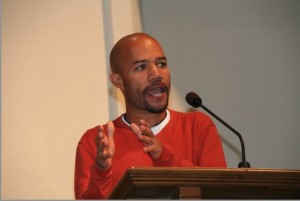
Ripples to Waves Program on Social Entrepreneurship brings change-makers from around the world to Stanford campus
Zawadi Nyong’o from Kenya, Taida Horozovic from Bosnia-Herzegovina, Ramzi Jaber from Palestine and Steve Williams ’92 from San Francisco may hail from different corners of the globe, but this spring they are coming together as part of the first group of Stanford Entrepreneurs in Residence at Stanford (SEERS).
The entrepreneurs in residence are a part of the inaugural Ripples to Waves Program on Social Entrepreneurship , sponsored and initiated by the Center on Democracy, Development, and the Rule of Law (CDDRL). SEERS Executive Director Kavita Ramdas got the idea to develop a program that bridged the gap between academia and social change activism during her sabbatical year as a CDDRL and Center for Philanthropy and Civil Society visiting scholar, eventually founding the Ripples to Waves Program on Social Entrepreneurship.
An early iteration of the program at the Global Fund for Women, where Ramdas previously served as CEO, proved difficult to implement.
“Our assessment of the two year effort was that it would be better suited to an academic institution where visiting practitioners would have the time and space to reflect and step back from their daily responsibilities but also share their wisdom with others,” Ramdas wrote in an email to The Daily.
The program’s later iteration at Stanford aims to bring social entrepreneurs to campus each quarter to attend classes, give talks and meet with students and professors. Through these efforts, the program hopes to create a dialogue to further the SEERS’ understanding of how to help their causes and spark a spirit of giving back at Stanford.
Two of the entrepreneurs in residence, Williams and Horozovic, reflected on how they left their organizations and decided to move to Stanford to gain new insights in their fields.
Williams co-founded People Organized to Win Employment Rights (POWER), which works in San Francisco on grassroots issues pertaining to low-income and/or minority groups.
“I left [POWER] in January because it felt like there were changes happening in my work with the economic and ecological crisis that are shifting the challenges that we all face and creating new opportunity,” Williams said.
Meanwhile, Horozovic left the organization she co-founded, the CURE Foundation, which tackles gender-based violence through educational and media tools as well as global campaigns.
“I was recuperating and resting and recharging my batteries because you don’t realize it when you’re there but it can be very difficult to live in a country where for years your daily newspaper covers how a new mass grave was found and dug out and another process of identification of 100 bodies,” Horozovic said. “Once I got here I realized that and I could gain a different perspective on other things I would like to be doing.”
For both Williams and Horozovic, the program is an outlet to learn from innovative ideas on creating change.
“It is an exciting opportunity for me to reflect on the work I have done, to connect with the community here and to learn about organizations in the area that are doing specifically funding for women,” Horozovic said.
Williams reflected on how he feels coming back to campus has fit into his life.
“It is an interesting prospect to come back to campus now 20 years since I graduated,” he said. “The time I spent at Stanford was really pivotal in the way I approach the work now, so in some ways I have come full circle.”
In fact, it was at Stanford that Williams found his interest in grassroots organizing.
“When I came to Stanford I thought I was going to go to law school,” Williams said. “Then after a summer program in Philadelphia which was trying to teach grassroots organizing skills….that’s when I knew what I wanted to do so I spent the last year on campus writing a thesis and trying to figure out how be a organizer.”
Williams said he distinctly remembers that the social entrepreneurship scene has changed drastically on campus. According to him, during his time as a student, organizers and leaders in the field would stay for only one night or give only one talk.
“My hope….is that we will find ways for the university to be infused with the energy of on-the-ground social change leaders as we begin from a place that acknowledges their considerable knowledge and understanding of how social change actually happens,” Ramdas said.
According to Williams, this new program is different because it affords students the opportunity to have a sustained dialogue with social entrepreneurs. Furthermore, students can become involved through a class called “Challenging the Status Quo: Social Entrepreneurs Advancing Democracy, Development and Justice.”
The class will engage the four entrepreneurs in residence and is led by Ramdas and Kathryn Stoner-Weiss, CDDRL deputy director and senior fellow at the Freeman Spogli Institute (FSI).
“The students in the class have been asking some very sharp questions that are pushing all the fellows to think about the work they have done and hope to be doing in the future,” Williams said.
